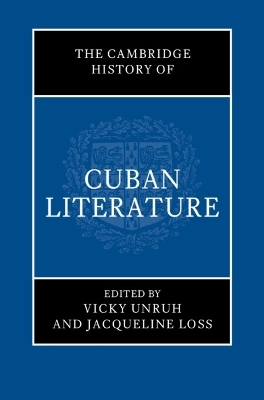
The Cambridge History of Cuban Literature
Cambridge University Press (Verlag)
978-1-009-16834-2 (ISBN)
Extending from the seventeenth to the twenty-first century, The Cambridge History of Cuban Literature is the first book in English to tell the intricate story of Cuban literary-intellectual culture from the seventeenth-century to the twenty-first century. This landmark book highlights the intricacies of linguistic and cultural translation embodied in telling a story in English about a body of work expressed predominantly in Spanish, but also French, Haitian Kreyòl, Angolan Portuguese, and English. Broad in its scope, this book encompasses such major figures as Gómez de Avellaneda, Heredia, Plácido, Manzano, Villaverde, Martí, Casal, Carpentier, L. Cabrera, Mañach, Loynaz, Piñera, Lezama Lima, and Cabrera Infante, as well as theatre and performance groups, film, post-revolutionary projects, post-1989 Special Period writers, and literature of Cuba's diasporas. It highlights four key features weaving through Cuban literary history: its engagement with international networks; its key role in cultural identity debates throughout Latin America; persistent debates about race, gender, and class; and the tropes of travel and movement—voluntary, exploratory, enslaved, migratory, or exilic.
Vicky Unruh is author of the groundbreaking book Latin American Vanguards: The Art of Contentious Encounters (1994), Performing Women and Modern Literary Culture in Latin America (2006), and numerous critical essays She is also co-editor of Telling Ruins in Latin America (with Michael Lazzara) (2009). She is the recipient of multiple research, teaching, and mentoring awards. Jacqueline Loss is a critic of Cuban and Latin American literary-cultural studies. Her books Dreaming in Russian (2013) and Caviar with Rum (edited with José Manuel Prieto) (2012) pioneered research into the Soviet imaginary in Cuban culture. Her translation of An Inquiry into Choteo (Jorge Mañach) is a key reference for reflection on Cuba's early twentieth century.
Introduction: unfinished histories; Part I. Literature in the Early Colony: 1. Silvestre de Balboa's Espejo de paciencia and the unfinished foundational story of Cuban literature; 2. José Martín Félix de Arrate's enlightenment discourse of Cuban exceptionalism; Part II. Cuban Literature's Long Nineteenth Century: 3. Alexander von Humboldt and the cultural invention of Cuba among its nineteenth-century intellectual elite; 4. Philosophy and pedagogy in Varela, Luz y Caballero, and Varona; 5. Mercedes Merlin and the rhetoric of life writing, exile, and race; 6. The lyric vernacular of Cuban romanticism; 7. Gertrudis Gómez de Avellaneda as literary precursor and transatlantic intellectual; 8. Racialized futures: Slavery, miscegenation, and speculative literature; 9. Journalism and nineteenth-century literary culture; 10. José Martí as hemispheric visionary; 11. Julian del Casal and the other faces of Cuban Modernismo; 12. Performance worlds of nineteenth-century Cuban theatre; Part III. Literary and Intellectual Culture in the Twentieth-Century Republic: 13. The literary intellectuals of the early Cuban republic; 14. The invention of the Black Cuban in the early twentieth century; 15. The fluid expressive communities of Cuba's interwar avant-gardes; 16. Lydia Cabrera and Afro-Caribbean imaginaries; 17. The fictions of new urban subjects; 18. The aesthetics of Dulce María Loynaz; 19. José Lezama Lima and the orbits of Orígenes; 20. Alejo Carpentier and Cuba's literary twentieth century; 21. The weighted literary islands of Virgilio Piñera; Part IV. The Revolution's Literary-Cultural Initiatives and Their Early Discontents: 22. Beginnings: testimonios, experimentalism, and their legacies; 23. Imagining Cuba's new revolutionary communities through film (1959–1989); 24. Shaping new cultural literacies; 25. The social life of music in Cuban literary culture; 26. Casa de las Américas and revolutionary configurations of Latinoamericanismo; 27. The travels of fiction in the Cuban diaspora; 28. Cuba's poetic imaginary (1959–1989); 29. The artistic worlds of Guillermo Cabrera Infante; 30. The diasporic odysseys of Reinaldo Arenas and his writing; Part V. Cuba and Its Diasporas into the New Millennium: 31. Alternative cultural projects and their histories; 32. Ediciones Vigía and the cultural legacies of Matanzas; 33. The fiction of Cuba's special period; 34. Critique and decentralization in Cuban film after 1989; 35. The temporality of twentieth and twenty-first century Cuban theatre; 36. The long reach of Haiti in Cuban literature; 37. Cuban afterlives of the Cuban and Angolan revolutions; 38. Anti-exceptionalism in detective fiction, speculative fiction, and graphic novels; 39. Cuban women's writing at the millennium's turn; 40. Queering the revolution and its diasporas; 41. The performance art of global Cuba; 42. Twenty-first-century Cuban film and diaspora; 43. Cuba's poetic imaginary (1989–2020); 44. Prose narratives from Cuban America; 45. Cuban theatre of the diaspora in the United States; Epilogue: 46. Teleology, tempests, and voicings of history.
| Erscheinungsdatum | 21.08.2024 |
|---|---|
| Zusatzinfo | Worked examples or Exercises |
| Verlagsort | Cambridge |
| Sprache | englisch |
| Maße | 159 x 236 mm |
| Gewicht | 1410 g |
| Themenwelt | Literatur |
| Geisteswissenschaften ► Sprach- / Literaturwissenschaft ► Anglistik / Amerikanistik | |
| Geisteswissenschaften ► Sprach- / Literaturwissenschaft ► Literaturwissenschaft | |
| Sozialwissenschaften ► Ethnologie | |
| Sozialwissenschaften ► Soziologie | |
| ISBN-10 | 1-009-16834-7 / 1009168347 |
| ISBN-13 | 978-1-009-16834-2 / 9781009168342 |
| Zustand | Neuware |
| Haben Sie eine Frage zum Produkt? |
aus dem Bereich


